特殊句式(倒装句)
- 格式:ppt
- 大小:147.50 KB
- 文档页数:27
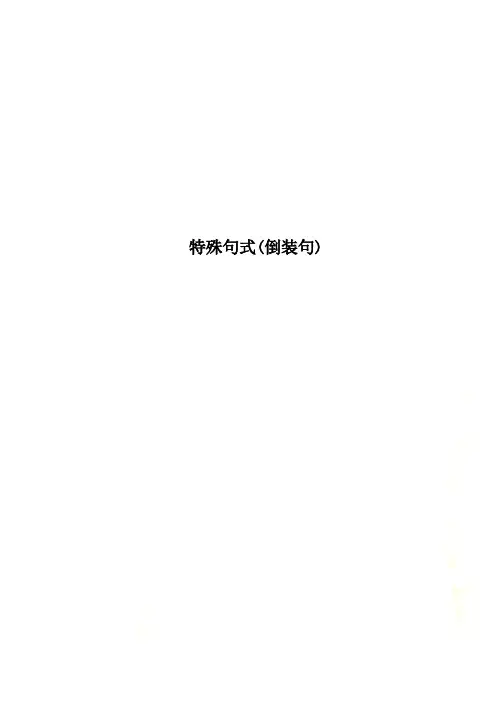
特殊句式(倒装句)高考英语语法复习专题------ 特殊句式一、考点聚焦倒装句部分倒装1. 否定意义的词或短语,位于句首,需部分倒装。
如否定词no, not, never;半否定词hardly, seldom, scarcely, barely, rarely, little, few;no合成的代词或副词nobody, nothing, nowhere;否定的短语not until, by no means, in no way, in no time, under no circumstances。
No word did he say before he left.Never had I heard or seen such a thing.Little did I know about it.Nowhere will you find better roses than theses.Not until he went abroad did he know the truth.By no means shall we give up.2. not only (merely, alone, simply)…(but) also 连接两个并列分句,前一分句需倒装。
Not only did we lose our money, but we also came close to losing our lives.Not simply is this book interesting but alsoinstructive.注意:Not only you but also I(连接并列主语不倒装)will attend the meeting.3. neither…nor连接两个并列分句,前后两个分句都倒装。
Neither did they write nor did they telephone. Neither is he wrong nor are you.Neither could I help you, nor could he.Neither French nor German do I know.Neither on Saturday nor on Sunday do we have lessons.注意:Neither you nor I(连接并列主语不倒装)like this book.4. Only + 状语,位于句首,需部分倒装。
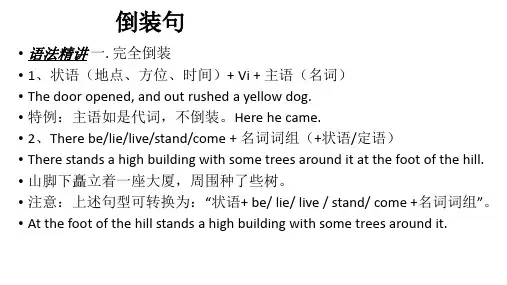
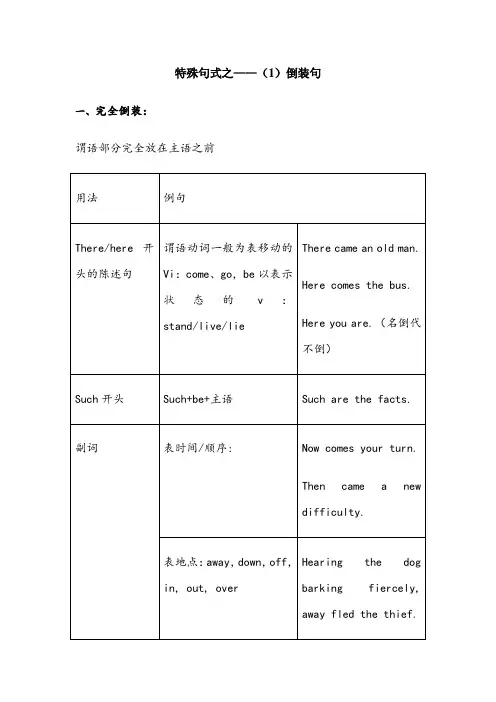
特殊句式之——(1)倒装句一、完全倒装:谓语部分完全放在主语之前练习:1.For a moment nothing happened. Then___all shouting together.A.voices had come voicesB. would come voices come2.Hearing the dog barking fiercely, away___.A.fleeing the thief fleeing the thiefB.the thief was fleeing the thief二、部分倒装只把be动词、助动词、情态动词提到主语前,叫部分倒装。
注意:so+sb/sth.+助动词某人、某物确实如此Eg. Helen likes music,so she does.练习:by increasing the number of doctors by 50 percent___ properly in this hospital.A.can be the patients treated the patients be treated C.the patients can be treated can be the patientsonce___ to Michael that he could one day become a top student in his class.it did occur occurred it occur3.——I reminded you not to forget the appointment.——____.A.So you didB. So I do not did you do I三、形式倒装(强调作用)将强调内容提前,主谓不倒装练习:____,his idea was accepted by all the people at the meeting.A.Strange as might it soundB.As it might sound strangeC.As strange it might soundD.Strange as it might sound四、倒装句综合练习题:1.(2014陕西)No sooner___stepped on the stage than the audience broke into thunderous applause.A.had Mo Yan Yan had Mo Yan Yan has2.(2016天津十二区县二联)So buried___ in doing her homework that she didn’t notice it got dark outside.A.was sheB. she was she did3.(2015天津十二区县一联)Only when our project has been approved of by the committee ____to carry it out.A.did we start started we start start4.(2015天津七校四月联考)Not until I had watched the football match between Brazil and Germany_____ to bed last night.A.I went had gone I gone I gone5.(2015天津南开中学高三五测)Little ____ about her own safety, thought she was in great danger herself.A.did Marry care did care does care Mary care6.(2015陕西质检二)It is all your fault. By no means____ left alone at home.A.should a two-year-old beB. a two-year-old should be be a two-year-old a two-year-old should7.(2016江苏苏锡常镇二模)____on mobile phones for storinginformation that people are unable to remember basic things.A.Such is the dependence dependence doesthey are dependent do they depend8.(2015天津红桥区一模)It is known that water is not an endless resource;_____can it be made once more, so we should save and protect it.A.so9.(2016天津高考压轴卷)Into the dark apartment_____,who was quite surprised when everyone shouted “Happy birthday!”A.did David walk did walk walked David10.(2014重庆市重庆一中高三下学期第一次月考,29)— Are the rest of our guests here—Not yet…. Look, there _____!A. come theyB. they cameC. do they comeD. they come11.(2014吉林省实验中学高三第一次模拟,29)______ you eat the correct food ____ be able to keep fit and stay healthy.A. Unless; will youB. Only if; you willC. Only if; will youD. Unless; you will12.(河南省中原名校2013届高三上学期期中联考,34)It's too messy in your room. Look, by the bed ____ a pile of dirty clothes.A. are liedB. layC. are lyingD. lies13.(2015天津,3)Only when Lily walked into the office______that she had left the contract at home.realized she realized has realized she realize 14.(2012天津, 6) Only after Mary read her composition the second time_____ the spelling mistake.A. did she noticeB. she noticedC. does she noticeD. she has noticed15.(2017和平区高三年级模拟考试)I’m my illness, I would have come and lent you a helping hand.Were it not B. If it were not it not been it has not been16.(2017十二区县高三年级模拟考试)Nowadays many teenagers often take their parents’ love for granted. Seldom____what they should return them when they are old.they think think they they17.(11福建)—It’s nice.Never before ____such a special drink!—I’m glad you like it.A. I have hadB. I hadC. have I hadD. had I18. (10江西)Not until he left his home to know how important the family was for him.A. did he beginB. had he begunC. he beganD. he has begun19. (10四川)We laugh at jokes, but seldom about how they work.A. we thinkB. think weC. we do thinkD. do we think20. (09重庆)Unsatisfied with the payment, he tookthe job just to get some work experience.A. though was heB. though he wasC. he was thoughD. was he though。
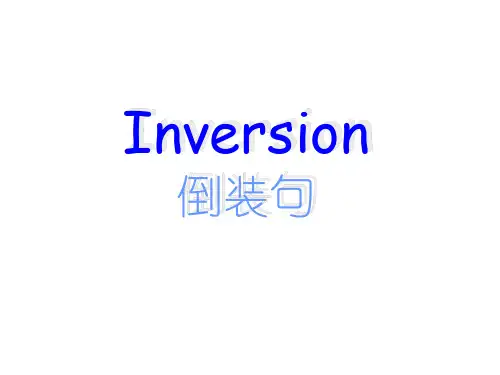
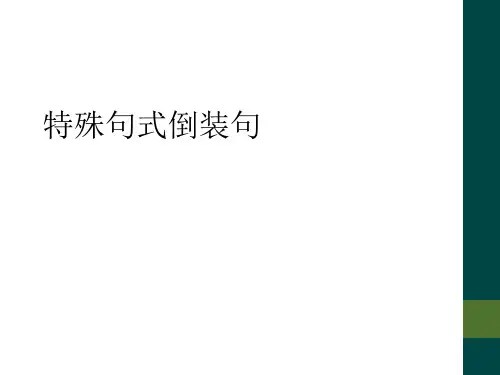
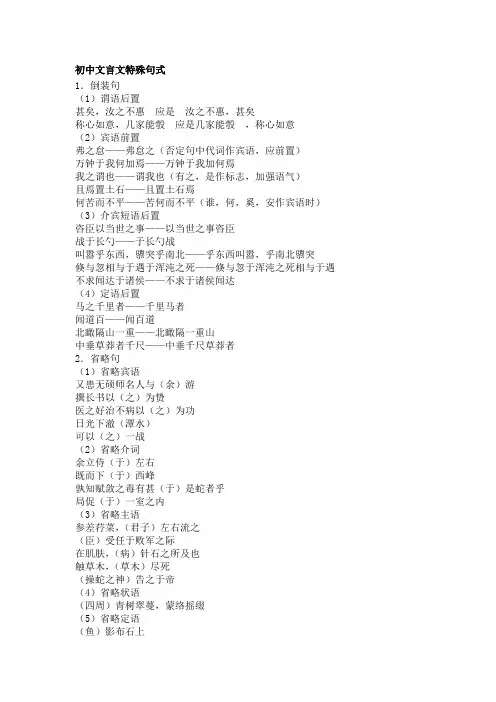
初中文言文特殊句式1.倒装句(1)谓语后置甚矣,汝之不惠应是汝之不惠,甚矣称心如意,几家能彀应是几家能彀,称心如意(2)宾语前置弗之怠——弗怠之(否定句中代词作宾语,应前置)万钟于我何加焉——万钟于我加何焉我之谓也——谓我也(有之,是作标志,加强语气)且焉置土石——且置土石焉何苦而不平——苦何而不平(谁,何,奚,安作宾语时)(3)介宾短语后置咨臣以当世之事——以当世之事咨臣战于长勺——于长勺战叫嚣乎东西,隳突乎南北——乎东西叫嚣,乎南北隳突倏与忽相与于遇于浑沌之死——倏与忽于浑沌之死相与于遇不求闻达于诸侯——不求于诸侯闻达(4)定语后置马之千里者——千里马者闻道百——闻百道北瞰隔山一重——北瞰隔一重山中垂草莽者千尺——中垂千尺草莽者2.省略句(1)省略宾语又患无硕师名人与(余)游撰长书以(之)为贽医之好治不病以(之)为功日光下澈(潭水)可以(之)一战(2)省略介词余立侍(于)左右既而下(于)西峰孰知赋敛之毒有甚(于)是蛇者乎局促(于)一室之内(3)省略主语参差荇菜,(君子)左右流之(臣)受任于败军之际在肌肤,(病)针石之所及也触草木,(草木)尽死(操蛇之神)告之于帝(4)省略状语(四周)青树翠蔓,蒙络摇缀(5)省略定语(鱼)影布石上(鸟)毛羽(鱼)鳞鬣之间皆有喜气所以动(其)心忍(其)性(6)省略谓语一鼓作气,再(鼓)而衰,三(鼓)而竭必以情(断之)公将鼓之,刿曰:未可(鼓之)(7)兼语省略日扳仲永环谒于邑人,不使(之)学3.被动句(1)“于,受…于”表被动困于心,衡于虑,而后作(2)“为…所”表被动山峦为晴雪所洗(3)“见,见…于”表被动虽欲强聒,终必蒙见察吾长见笑于大方之家(4)无任何标志的被动句帝感其诚傅说举于版筑之间4。
表判断句式(1)“…者…也”表判断,是夫此六者,皆谦德也有亭翼然临于泉上者,醉翁亭也(2)“…也”此臣所以报先帝,而忠陛下之职也在肌肤,针石之所及也夫战,勇气也(3)“…者也”舍鱼而取熊掌者也(4)没有任何标志金溪民方仲永、世隶耕,无他但熟尔1.固定句式(1)与使吾先死也,无宁汝先吾而死(与…无宁:与其…不如)(2)吾非至于子之门,则殆矣(非…则:如果不是…就)(3)非人哉(不是)(4)幸尚宽,何为不可(何为即为何:为什么)(5)既已纳其自托,宁可以急相邪?(宁…邪,表反问:难道…吗)(6)吾射不亦精乎(不亦…乎,不也…吗)使君一何愚(一何:多么)罗敷年几何(几何:多大)然则北通巫峡,南极潇湘(然则:既然这样,那么)然而不胜者,是天时不如地利(然而:虽然这样,可是)如太行王屋何?(如…何:对…该怎么办,把…怎么样)以丛草为林(以…为:把…当作)河曲智叟亡以应(亡以即无以)家贫无从致书以观(无从:没有用来…的)必能裨补阙漏,有所广益{有所:有…的(人,事,物)}凡所应有,无所不有{无所:没有…的(人,事,物)}吾欲之南海,何如?(何如,如何;若何:怎么样,怎么,怎么办)臣是以无请也(是以,是故:因此,所以)此先汉所以兴隆也(所以:用来…的,…的原因,…的方法)览物之情,得无异乎(得无…乎,得无…耶:恐怕…吧,莫非…吧)有蒋氏者,专其利三世矣(有…者:有人…人)问女何所思{何所…的(人,东西,事情)是谁(什么)}与其坐而待亡,孰若起而拯之(孰若,与其…孰若:哪如,与其…哪如)何陋之有(何…之有:有什么…呢)然则向时而乐耶?{(既然)这样,那么}若夫日出而林霏开(若夫:像那…)夫子何命焉为(何…为:有什么…还要…干什么)。
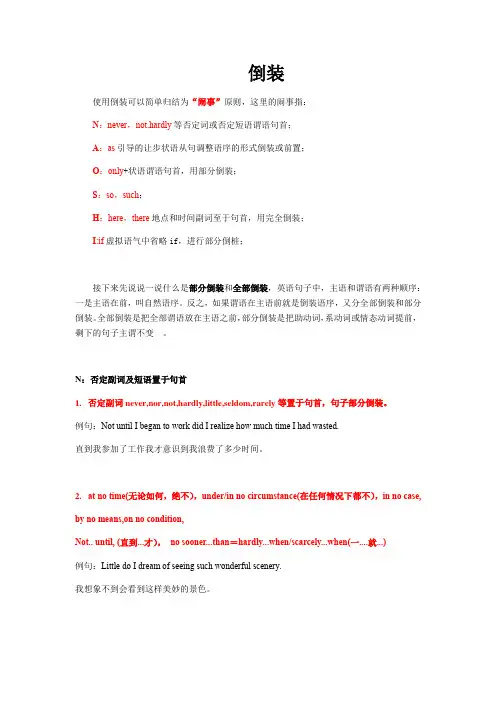
倒装使用倒装可以简单归结为“闹事”原则,这里的闹事指:N:never,not,hardly等否定词或否定短语谓语句首;A:as引导的让步状语从句调整语序的形式倒装或前置;O:only+状语谓语句首,用部分倒装;S:so,such;H:here,there地点和时间副词至于句首,用完全倒装;I:if虚拟语气中省略if,进行部分倒桩;接下来先说说一说什么是部分倒装和全部倒装,英语句子中,主语和谓语有两种顺序:一是主语在前,叫自然语序。
反之,如果谓语在主语前就是倒装语序,又分全部倒装和部分倒装。
全部倒装是把全部谓语放在主语之前,部分倒装是把助动词,系动词或情态动词提前,剩下的句子主谓不变。
N:否定副词及短语置于句首1.否定副词never,nor,not,hardly,little,seldom,rarely等置于句首,句子部分倒装。
例句:Not until I began to work did I realize how much time I had wasted.直到我参加了工作我才意识到我浪费了多少时间。
2.at no time(无论如何,绝不),under/in no circumstance(在任何情况下都不),in no case, by no means,on no condition,Not.. until, (直到...才),no sooner...than=hardly...when/scarcely...when(一....就...)例句:Little do I dream of seeing such wonderful scenery.我想象不到会看到这样美妙的景色。
A:由as引导让步状语从句要用部分倒装或前置。
句式为:表语/状语/动词原形+as+主语+其他,它只把强调的内容提到句首,主谓并不倒装,其中注意,如果从句的表语提前,且表语是名词,复数或不可数直接提前,后面句子照抄,如果是单数,冠词要省去。
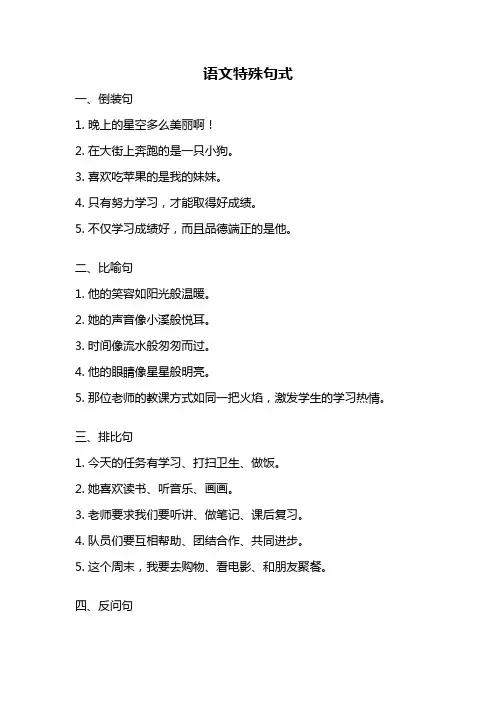
语文特殊句式一、倒装句1. 晚上的星空多么美丽啊!2. 在大街上奔跑的是一只小狗。
3. 喜欢吃苹果的是我的妹妹。
4. 只有努力学习,才能取得好成绩。
5. 不仅学习成绩好,而且品德端正的是他。
二、比喻句1. 他的笑容如阳光般温暖。
2. 她的声音像小溪般悦耳。
3. 时间像流水般匆匆而过。
4. 他的眼睛像星星般明亮。
5. 那位老师的教课方式如同一把火焰,激发学生的学习热情。
三、排比句1. 今天的任务有学习、打扫卫生、做饭。
2. 她喜欢读书、听音乐、画画。
3. 老师要求我们要听讲、做笔记、课后复习。
4. 队员们要互相帮助、团结合作、共同进步。
5. 这个周末,我要去购物、看电影、和朋友聚餐。
四、反问句1. 这件事难道不是你做的吗?2. 他难道不知道这次考试的重要性吗?3. 这个问题难道我们解决不了吗?4. 你难道不明白这次活动的目的吗?5. 这个答案难道不是显而易见的吗?五、省略句1. 你今天上午干什么了?---写作业。
2. 他喜欢吃什么?---苹果。
3. 昨天晚上去了哪里?---电影院。
4. 你住在哪里?---北京。
5. 明天有什么计划?---看电影。
六、设问句1. 你认为这个问题该怎么解决呢?2. 你觉得这个活动有什么意义呢?3. 你对这个建议有什么看法呢?4. 你认为这个观点正确吗?5. 你对这个计划有什么建议呢?七、比较句1. 安静的小村庄和繁华的都市相比,更适合居住。
2. 她的成绩比我好。
3. 这个问题比较难,需要多加思考。
4. 这个城市的交通比较方便。
5. 这本书跟那本书相比,更有趣。
八、插入语句1. 我们终于在漫长的旅途中到达了目的地。
2. 在这个令人激动的时刻,我感到非常开心。
3. 这个问题,我觉得,不好回答。
4. 昨天,我跟朋友一起去了动物园。
5. 那个地方,据说,非常美丽。
九、反诘句1. 你真的相信他说的话吗?2. 他居然没有来参加会议?3. 你难道不知道这个消息吗?4. 他怎么能这样对待朋友呢?5. 他竟然不记得我们的约定?十、感叹句1. 多么美丽的风景啊!2. 多么可爱的小猫咪!3. 多么幸运的一天啊!4. 多么令人愉快的音乐!5. 多么丰富的知识啊!。
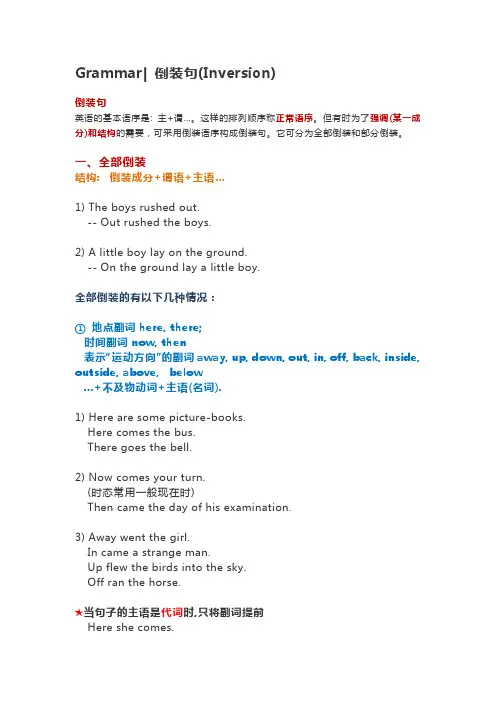
Grammar| 倒装句(Inversion)倒装句英语的基本语序是: 主+谓…。
这样的排列顺序称正常语序。
但有时为了强调(某一成分)和结构的需要,可采用倒装语序构成倒装句。
它可分为全部倒装和部分倒装。
一、全部倒装结构: 倒装成分+谓语+主语…1) The boys rushed out.-- Out rushed the boys.2) A little boy lay on the ground.-- On the ground lay a little boy.全部倒装的有以下几种情况:①地点副词here, there;时间副词now, then表示“运动方向”的副词away, up, down, out, in, off, back, inside, outside, above, below...+不及物动词+主语(名词).1) Here are some picture-books.Here comes the bus.There goes the bell.2) Now comes your turn.(时态常用一般现在时)Then came the day of his examination.3) Away went the girl.In came a strange man.Up flew the birds into the sky.Off ran the horse.★当句子的主语是代词时,只将副词提前Here she comes.Away she went.Out they ran.②表示地点的介词短语+不及物动词+主语(名词)1) Under the big tree sat some students.2) At the school gate stood a guard.3) On top of the hill stood a tower.On the wall hangs a large map.4) South of the city lies a big company.5) They arrived at the house, in front of which sat a little girl.★主语是代词时,不用倒装③表语(done, doing, adj, 介短) +连系动词+主语1) Gone was the days when Chinese people used "foreign oil".2) Present at the meeting were Professor Li and many other guests.3) Lying on the floor was a boy aged about seventeen.4) Seated on the ground are a group of young men playing cards.二、部分倒装结构: 倒装成分+助动词+主语+谓语…1) He was able to go to school only when the war was over.--Only when the war was over was he able to go to school.2) I will never forget it.-- Never will I forget it.部分倒装的有以下几种情况:①含有否定意义的词开头如: never, hardly, rarely, barely, seldom, little, few, nowhere, no sooner…(than), hardly/scarcely…(when)…,in no time(马上), at no time/ in no way/ in no case/ by no means(决不), not, not only…(but also)…, not until…, nothing, nobody等等1) Not a word did he say at the meeting.2) Never have I heard such a thing.Nothing did I see.3) Little did she say in the discussion.4) Hardly had he seen me when he ran away.5) Not only is he a scientist, but also he is a painter.6) Not until I received his letter did I learn anything about it.7) In no time will he come back.8) In no way should we forget history.★not 否定主语或not only…but also…连接两个主语时不用倒装1) Not a word was said.2) Not only you but also I will go there.3) Little work was done yesterday.②用于only所修饰的副词,介短, 状语从句开头时.1) Only in this way can we learn English well.2) Only then did I realize I made such a big mistake.3) Only by seizing every minute can we finish the work on time.4) Only when he got home did he know what happened to her.★但only 修饰主语时不用倒装1) Only some boys passed the math exam.2) Only Dr. Yang can save his life.③so/ neither/ nor+助动词+主语…表示甲…, 乙“也”/ “也不...”1) He went to college last year, (and) so did I.2) He has been to Qingdao, so have I.3) He could not do it, neither/ nor could I.4) After that we never saw her again, nor did we hear from her.★在so +主+助动, 表示同意对方的说法,意为“的确如此”.--Jim does well in Chinese.--so he does.--It is very hot today.-- Yes, so it is.★Neither…nor…连接的两个句子都要倒装;not only…but also…连接的两个句子时,not only后面的句子要倒装1) Neither has he called on her, nor will he do so.2) Not only shall we learn from books, but also we should learn form practice.④在so/such …(that…)结构中.so +adj/adv 或such (a/an) adj 名词+助动词+主语…1) The book is so interesting that all the children like it.--So interesting is the book that all the children like it.2) He spoke so loudly that everyone could hear him clearly.--So loudly did he speak that everyone could hear him clearly.3) It is such fine weather that we decide to go for an outing.--Such fine weather is it that we decide to go for an outing.⑤某些频度副词(often, many a time, always, now and then, every two hours等) 放在句首时.1) Often did we warn them not to do so.2) Always will we remember the importance of the meeting.3) Many a time has he given us good advice.4) Now and then does Jones go to the cinema.★其实,特殊疑问句也属于部分倒装。
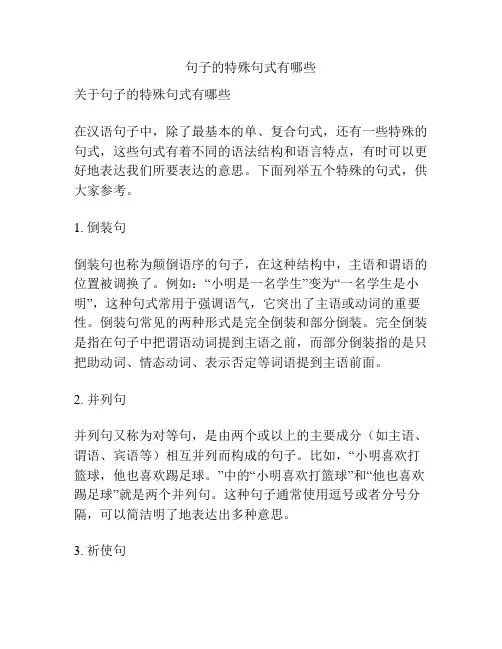
句子的特殊句式有哪些关于句子的特殊句式有哪些在汉语句子中,除了最基本的单、复合句式,还有一些特殊的句式,这些句式有着不同的语法结构和语言特点,有时可以更好地表达我们所要表达的意思。
下面列举五个特殊的句式,供大家参考。
1. 倒装句倒装句也称为颠倒语序的句子,在这种结构中,主语和谓语的位置被调换了。
例如:“小明是一名学生”变为“一名学生是小明”,这种句式常用于强调语气,它突出了主语或动词的重要性。
倒装句常见的两种形式是完全倒装和部分倒装。
完全倒装是指在句子中把谓语动词提到主语之前,而部分倒装指的是只把助动词、情态动词、表示否定等词语提到主语前面。
2. 并列句并列句又称为对等句,是由两个或以上的主要成分(如主语、谓语、宾语等)相互并列而构成的句子。
比如,“小明喜欢打篮球,他也喜欢踢足球。
”中的“小明喜欢打篮球”和“他也喜欢踢足球”就是两个并列句。
这种句子通常使用逗号或者分号分隔,可以简洁明了地表达出多种意思。
3. 祈使句祈使句也称为命令句,是表达命令、请求或建议的一种句型。
这种句子通常省略了主语,使用动词原形或者动词不定式,如:“过来!”、“请你帮我一下。
”、“不要挂断电话。
”这种句子通常灵活简洁,语气强烈,是生活中常用的一种句子结构。
4. 疑问句疑问句是指询问对方或自己是否了解某事的句子结构,其语调和词序都有所变化。
疑问句分为直接疑问句和间接疑问句。
直接疑问句是直接用疑问词提问,如“你在哪里?”而间接疑问句则由疑问句转述而来,如“我想知道你在哪里。
”5. 广义修饰句广义修饰句是由动词、形容词、副词、介词短语、不定式短语等修饰成分加上定语从句,构成一个复杂的修饰结构。
对于这种结构的句子,我们需要仔细分析句子成分之间的关系,找出主句和定语从句,才能完整理解其含义。
如:“他发现那个女孩,她和他小时候住在同一层楼。
”中的“那个女孩”是主句的宾语,而“她和他小时候住在同一层楼”是定语从句进一步修饰“那个女孩”。
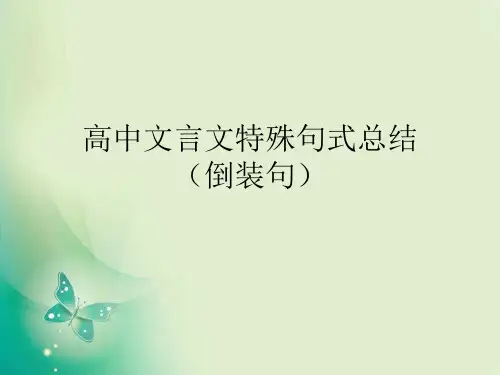
英语特殊句式语法英语语法中存在一些特殊的句式结构,它们具有独特的语法规则和用法。
在本文中,我们将介绍一些常见的英语特殊句式,并通过示例来解释它们的用法。
一、倒装句倒装句是英语中常见的特殊句式之一,它采取了主语和谓语动词的位置颠倒。
倒装句的用法多种多样,下面是一些常见的情况:1. 完全倒装:当句子以表示地点状态的副词(如here, there, now, then等)开头时,需要完全倒装。
例如:Here comes the bus.There goes my hat.2. 部分倒装:在某些特定的条件下,主语和谓语动词的位置需要部分颠倒。
a. 在用于表示否定的副词或短语(如never, seldom, hardly, not until 等)开头的句子中,需要将助动词或情态动词与主语颠倒。
例如:Never have I seen such a beautiful sunset.Not until she left did I realize how much I loved her.b. 在以表示条件的状语从句(如if, unless, whether等)开头的句子中,需将助动词和主语颠倒。
例如:If only I had more time, I would travel around the world.Whether it rains or not, we will go camping.二、虚拟语气虚拟语气是英语中常见的特殊句式之一,用于表示与事实相反、假设或愿望等情况。
以下是虚拟语气的几种常见形式:1. 虚拟条件句:用于表示与事实相反的假设情况,包括类型1、类型2和类型3三种类型。
a. 类型1:表示真实可能发生的假设例如:If she studies hard, she will pass the exam.b. 类型2:表示与事实相反,但在理论上有可能实现的假设例如:If I were you, I would quit that job.c. 类型3:表示与过去事实相反的假设例如:If I had studied harder, I would have passed the exam.2. 虚拟表达愿望例如:I wish I could play the piano like a professional.3. 虚拟表达建议、命令等例如:The teacher suggested that they should review the material again.三、强调句强调句是一种特殊的句式,它通过强调句子中的某个成分来表达特殊的意义。
初中文言文特殊句式之倒装句文言文特殊句式之倒装句现代汉语的句子成分的顺序,一般为“主─谓─宾”“定(状)─中心词”,但在文言文中,在一定条件下,句子成分的顺序会发生变化的,这就是古汉语中的所谓倒装句,即指文言文中一些句子成分的顺序出现了前后颠倒的情况。
主要有以下几种倒装形式:一、主谓倒装(谓语前置或主语后说)古汉语中,谓语的位置也和现代汉语中一样,一般放在主语之后,但有时为了强调和突出谓语的意义,在一些疑问句或感叹句中,就把谓语提前到主语前面。
例如:①甚矣,汝之不惠!(汝之不惠甚矣!)②安在公子能急人之困(公子能急人之困在安)③宜乎百姓之谓我爱也(百姓之谓我爱宜乎)④甚矣,乌纱之横,皂隶之俗哉!(乌纱之横,皂隶之俗甚矣!)二、定语后置1、在中心词和后置定语中间加“之”字,再用“者”字结尾,组成“中心词+之+定语+者” 的格式。
例如:①于是集谢庄少年之精技击者而诏之。
(精技击之少年)②五谷者,种之美者也。
(五谷是庄稼中的好种)③马之千里者一食或尽粟一石(千里马)④石之铿然有声者所在皆是也(铿然有声之石)2、在中心词和后置定语中间加“之”字,组成“中心词+之+定语”的格式,表示定语后置。
例如:①蚓无爪牙之利,筋骨之强,上食埃土,下饮黄泉,用心一也(蚓无利之爪牙,强之筋骨)②云霞雕色,有喻画工之妙,草木贲华,无待锦匠之奇。
(云霞绘出色彩,已超过巧妙的画师;草木装饰鲜花,不依靠神奇的绣工)③居庙堂之高则忧其民,处江湖之远则忧其君。
(居高之庙堂,处远之江湖)3、定语放在中心词后,用“者”字结尾,组成“中心词+定语+者”的格式。
例如:①遂率子孙荷担者三夫。
②其故人尝与佣耕者闻之。
[他(陈胜)一些曾经一道给人作雇工耕田的老朋友听到了这个消息]③太子及宾客知其事者皆白衣冠以送之(知其事之太子及宾客)④计未定,求人可使报秦者(求可使报秦之人)⑤村中少年好事者(好事之少年)4、在中心词和后置定语中间加“而”字,再用“者”字结尾,组成“中心词+而+定语+者” 的格式。